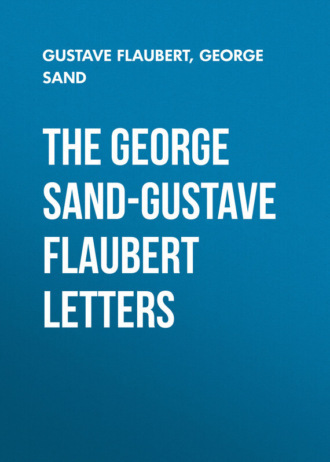 полная версия
полная версияThe George Sand-Gustave Flaubert Letters
Public intelligence seems to me to get lower and lower! To what depth of imbecility shall we descend? Belot's last book sold eight thousand copies in two weeks. Zola's Conquete de Plassans, seventeen hundred in six months, and there was an article about it. All the Monday-morning idiots have just been swooning away about M. Scribe's Une Chaine. France is ill, very ill, whatever they say; and my thoughts are more and more the color of ebony.
However, there are some pretty comic elements: (1) the Bazaine escape with the episode of the sentinel; (2) l'Histoire d'un Diamant by Paul de Musset (see the Revue des Deux Mondes for September); (3) the vestibule of the former establishment of Nadar near Old England [sic], where one can contemplate a life-size photograph of Alexander Dumas.
I am sure that you are finding me grouchy and that you are going to answer me: "What difference does all that make?" But everything makes a difference, and we are dying of humbug, of ignorance, of self-confidence, of scorn of grandeur, of love of banality, and imbecile babble.
"Europe which hates us, looks at us and laughs," said Ruy Blas. My
Heavens, she has a right to laugh.
CCLXXXIII TO GUSTAVE FLAUBERT
Nohant, 5th November, 1874
What, my Cruchard, you have been ill? That is what I feared, I who live in the woes of indigestion and yet hardly work at all, I am disquieted at your kind of life, the excess of intellectual expenditure and the seclusion. In spite of the charm that I have proved and appreciated at Croisset, I fear for you that solitude where you have no longer anyone to remind you that you must eat, drink and sleep, and above all walk. Your rainy climate makes you keep to the house. Here, where it does not rain enough, we are at least hustled out of doors by the beautiful warm sun and that Phoebus invigorates us, while our Phoebus-Apollo murders us.
But I am always talking to you as to a Cruchard philosophic and detached from his personality, to a Cruchard fanatical about literature and drunk with production. When, then, shall you be able to say to yourself: Lo! this is the time for rest, let us taste the innocent pleasure of living for life's sake, of watching with amazement the agitations of others and of not giving to them anything except the excess of our overflow. It does one good to ruminate over what one has assimilated in life, sometimes without attention and without discrimination.
Old friendships sustain us and all at once they distress us. I have just lost my poor blind Duvernet, whom you have seen at our house. He expired very quietly without suspecting it and without suffering. There is another great void about us and my nephew, the substitute, has been nominated for Chateauroux. His mother has followed him.
So we are all alone. Happily we love one another so much that we can live like that, but not without regret for the absent ones. Plauchut left us yesterday to return at Christmas. Maurice is already at work preparing a splendid performance of marionettes for us. And you, if you are in Paris, won't you come to keep the Christmas Eve revels with us? You will have finished your rehearsals, you will have had a success, perhaps you will be in the mood to return to material life, eating truffles?
Tell us about yourself, do not be ill, always love your old troubadour and his people who love you too.
G. Sand
CCLXXXIV. TO GEORGE SAND
Wednesday, 2nd December, 1874
I am having remorse about you. It is a crime to let so long a time elapse without answering such a letter as your last. I was waiting to write to you until I had something definite to tell you about le Sexe faible. What is definite is that I took it away from the Cluny a week ago. The cast that Weinschenk proposed to me was odiously stupid and he did not keep the promises that he made. But, God be thanked, I withdrew in time. At present my play has been offered to the Gymnase. No news up to now from Montigny.
I am worrying like five hundred devils about my book, asking myself sometimes if I am not mad to have undertaken it. But, like Thomas Diafoirus, I am stiffening myself against the difficulties of execution which are frightful. I need to learn a heap of things about which I am ignorant. In a month I hope to finish with the agriculture and the gardening, and I shall only then be at the second third of my first chapter.
Speaking of books, do read Fromont et Risler, by my friend Daudet, and les Diaboliques, by my enemy Barbey d'Aurevilly. You will writhe with laughter. It is perhaps owing to the perversity of my mind, which likes unhealthy things, but the latter work seemed to me extremely amusing; it is the last word in the involuntary grotesque. In other respects, dead calm, France is sinking gently like a rotten hulk, and the hope of salvage, even for the staunchest, seems chimerical. You need to be here, in Paris, to have an idea of the universal depression, of the stupidity, of the decrepitude in which we are floundering.
The sentiment of that agony penetrates me and I am sad enough to die. When I am not torturing myself about my work, I am groaning about myself. That is the truth. In my leisure moments, all I do is to think of the dead, and I am going to say a very pretentious thing to you. No one understands me; I belong to another world. The men of my profession are so little of my profession! There is hardly anyone except Victor Hugo with whom I can talk of what interests me. Day before yesterday he recited by heart to me from Boileau and from Tacitus. That was like a gift to me, the thing is so rare. Moreover, the days when there are not politicians at his house, he is an adorable man.
CCLXXXV. TO GUSTAVE FLAUBERT, at Croissset
Nohant, 8th December, 1874
Poor dear friend,
I love you all the more because you are growing more unhappy. How you torment yourself, and how you disturb yourself about life! for all of which you complain, is life; it has never been better for anyone or in any time. One feels it more or less, one understands it more or less, one suffers with it more or less, and the more one is in advance of the age one lives in, the more one suffers. We pass like shadows on a background of clouds which the sun seldom pierces, and we cry ceaselessly for the sun which can do no more for us. It is for us to clear away our clouds.
You love literature too much; it will destroy you and you will not destroy the imbecility of the human race. Poor dear! imbecility, that, for my part, I do not hate, that I regard with maternal eyes: for it is a childhood and all childhood is sacred. What hatred you have devoted to it! what warfare you wage on it!
You have too much knowledge and intelligence, you forget that there is something above art: namely, wisdom, of which art at its apogee is only the expression. Wisdom comprehends all: beauty, truth, goodness, enthusiasm, in consequence. It teaches us to see outside of ourselves, something more elevated than is in ourselves, and to assimilate it little by little, through contemplation and admiration.
But I shall not succeed in changing you. I shall not even succeed in making you understand how I envisage and how I lay hold upon HAPPINESS, that is to say, the acceptation of life whatever it may be! There is one person who could change you and save you, that is father Hugo; for he has one side on which he is a great philosopher, while at the same time he is the great artist that you require and that I am not. You must see him often. I believe that he will quiet you: I have not enough tempest in me now for you to understand me. As for him, I think that he has kept his thunderbolts and that he has all the same acquired the gentleness and the compassion of age.
See him, see him often and tell him your troubles, which are great, I see that, and which turn too much to spleen. You think too much of the dead, you think that they have too soon reached their rest. They have not. They are like us, they are searching. They labor in the search.
Every one is well, and embraces you. As for me, I do not get well, but I have hopes, well or not, to keep on still so as to bring up my grandchildren, and to love you as long as I have a breath left.
G. Sand
CCLXXXVI. TO GUSTAVE FLAUBERT, at Croissset
Nohant, 16th January, 1875
I too, dear Cruchard, embrace you at the New Year, and wish that you may have a tolerable one, since you do not care to hear the myth happiness spoken of. You admire my serenity; it does not come from my depths, it comes from my necessity of thinking only of others. There is but a little time left, old age creeps on and death is pushing me by the shoulders.
I am as yet, if not necessary, at least extremely useful, and I shall go on as long as I have a breath, thinking, talking, working for them.
Duty is the master of masters, it is the real Zeus of modern times, the son of Time, and has become his master. It is that which lives and acts outside of all the agitations of the world. It does not reason, does not discuss. It examines without fear, it walks without looking behind it; Cronos, the stupid, swallowed stones, Zeus breaks them with the lightning, and the lightning is the will. I am not a philosopher, I am a servant of Zeus, who takes away half of their souls from slaves, but who leaves them entire to the brave.
I have no more leisure to think of myself, to dream of discouraging things, to despair of human-kind, to look at my past sorrows and joys and to summon death.
Mercy! If one were an egoist, one would see it approach with joy; it is so easy to sleep in nothingness, or to awaken in a better life! for it opens these two hypotheses, or to express it better, this antithesis.
But, for the one who must continue working, death must not be summoned before the hour when exhaustion opens the doors of liberty. You have had no children. It is the punishment of those who wish to be too independent; but that suffering is nevertheless a glory for those who vow themselves to Apollo. Then do not complain for having to grub, and describe your martyrdom to us; there is a fine book to be written about that.
You say that Renan is despairing; for my part, I don't believe that: I believe that he is suffering as are all those who look high and far ahead; but he ought to have strength in proportion to his vision. Napoleon shares his ideas, he does well if he shares them all. He has written me a very wise and good letter. He now sees relative safety in a wise republic, and I, too, think it still possible. It will be very bourgeois and not very ideal, but one has to begin at the beginning. We artists have no patience at all. We want the Abbey of Theleme at once; but before saying, "Do what you want!" one must go through with "Do what you can!" I love you and I embrace you with all my heart, my dear Polycarp. My children large and small join with me.
Come now, no weakness! We all ought to be examples to our friends, our neighbors, our fellow citizens. And how about me, don't you think that I need help and support in my long task that is not yet finished? Don't you love anyone, not even your old troubadour, who still sings, and often weeps, but who conceals himself when he weeps, as cats do when they die?
CCLXXXVII. TO GEORGE SAND
Paris, Saturday evening
Dear master,
I curse once more THE DRAMATIC MANIA and the pleasure that certain people have in announcing remarkable news! Someone had told me that you were VERY ill. Your good handwriting came to reassure me yesterday morning, and this morning I have received the letter from Maurice, so the Lord be praised!
What to tell you about myself? I am not stiff, I have … I don't know what. Bromide of potassium has calmed me and given me eczema on the middle of my forehead.
Abnormal things are going on inside me. My psychic depression must relate to some hidden cause. I feel old, used up, disgusted with everything, and others bore me as I do myself.
However, I am working, but without enthusiasm: as one does a stint, and perhaps it is the work that makes me ill, for I have undertaken a senseless book.
I lose myself in the recollections of my childhood like an old man … I do not expect anything further in life than a succession of sheets of paper to besmear with black. It seems to me that I am crossing an endless solitude to go I don't know where. And it is I who am at the same time the desert, the traveller, and the camel.
I spent the afternoon today at the funeral of Amedee Achard. The
Protestant ceremonies were as inane as if they had been Catholic.
ALL PARIS and the reporters were there in force!
Your friend, Paul Meurice, came a week ago to ask me to "do the
Salon" in le Rappel. I declined the honor, for I do not admit that anyone can criticise an art of which he does not know the technique!
And then, what use is so much criticism!
I am reasonable. I go out every day, I exercise, and I come home tired, and still more irritated, that is the good I get out of it. In short, your troubadour (not very troubadourish) has become a sad bonehead.
It is in order not to bore you with my complaints that I write so rarely to you now, for no one has a livelier sense than I of my unbearableness.
Send me Flamarande; that will give me a little air.
I embrace you all, and especially you, dear master, so great, so strong, and so gentle. Your Cruchard, who is more and more cracked, if cracked is the right word, for I perceive that the contents are escaping.
CCLXXXVIII. TO GUSTAVE FLAUBERT 20th February
Then you are quite ill, dear old fellow? I am not worried about it, since it concerns only nerves and rheumatisms, and I have lived seventy years with all that nuisance in my body, and I am still healthy. But I am sad to know that you are bored, suffering, and your spirit turned to darkness as it necessarily is when one is ill.
I was sure that a moment would come when someone would prescribe walking to you. All your illness comes from the lack of exercise, a man of your strength and your complexion ought to have lived an athletic life.
Don't sulk then about the very wise order that condemns you to an hour's walk each day.
You fancy that the work of the spirit is only in the brain, you are very much mistaken, it is also in the legs.
Tell me that two weeks of this regime has cured you. It will happen,
I am sure of it.
I love you, and I embrace you, as does every one of my brood.
Your old troubadour
CCLXXXIX. TO GUSTAVE FLAUBERT
Nohant, 25th March, 1875
Don't be worried about me, my Polycarp. I have nothing serious, a little grippe, and this right arm which hardly moves but which electricity will cure. One thinks that it is an effort.
I am much more worried about you, although you are ten times as strong as I am, but your morale is affected whereas mine takes what comes, in a cowardly way, if you like, but there is perhaps a philosophy in knowing how to be cowardly rather than angry.
Do write to me, tell me that you are going out of doors, that you are walking, that you are better. – I have finished going over the proofs of Flamarande. That is the most boring part of the task.
I shall send you the book when it is published. I know that you do not like to read bit by bit.
I am a little tired; however, I want to begin something else. Since it is not warm enough to go out, I get bored with not having anything on the stocks. Everything is going well in the nest, except for a few colds. Spring is so peevish this year! At last the pale sun will become the dear Phoebus-Appolo with the shining hair, and all will go well.
Aurore is getting so big that one is surprised to hear her laugh and play like a child, always good, and tender, the other is always very funny and facetious.
Tell us of yourself and always love us as we love you.
Your old troubadour
CCXC. TO GUSTAVE FLAUBERT
Nohant, 7th May, 1875
You leave me without news of you? You say that you prefer to be forgotten, rather than to complain ceaselessly, as it is very useless and since you will not be forgotten; complain then, but tell us that you are alive and that you still love us.
As you are much nicer, the more surly you are, I know that you are not rejoicing over the death of poor Michel. For me, it is a great loss in every way, for he was absolutely devoted to me and proved it all the time by his care and services without number.
We are all well here. I am better since it is not cold any more, and I am working a great deal. I am also doing many water colors, I am reading the Iliad with Aurore, who does not like any translation except Leconte de Lisle's, insisting that Homer is spoiled by approximate renderings.
The child is a singular mixture of precocity and childishness. She is nine years old and so large that one would think her twelve. She plays dolls with passion, and she is as LITERARY as you or I, meanwhile learning her own language which she does not yet know.
Are you still in Paris in this lovely weather? Nohant is now STREAMING with flowers, from the tips of the trees to the turf; Croisset must be even prettier, for it is cool, and we are struggling with a drought that has now become chronic in Berry. But if you are still in Paris, you have that beautiful Pare Monceau under your eyes where you are walking, I hope, since you have to. Life is at the price of walking!
Won't you come to see us? Whether you are sad or gay, we love you the same here, and we wish that affection meant something to you, but we shall give it to you, and we give it to you without conditions.
I am thinking of going to Paris next month, shall you be there?
G. Sand
CCXCI. TO GEORGE SAND
Croisset, 10th May, 1875
A wandering gout, pains that go all over me, an invincible melancholy, the feeling of "universal uselessness" and grave doubts about the book that I am writing, that is what is the matter with me, dear and valiant master. Add to that worries about money with melancholic recollections of the past, that is my condition, and I assure you that I make great efforts to get out of it. But my will is tired. I cannot decide about anything effective! Ah! I have eaten my white bread first, and old age is not announcing itself under gay colors. Since I have begun hydrotherapy, however, I feel a little less like a COW, and this evening I am going to begin work without looking behind me.
I have left my apartment in the rue Murillo, and I have taken a larger one which is next to the one that my niece has just reserved on the Boulevard Reine Hortense. I shall be less alone next winter, for I cannot endure solitude.
Tourgueneff seemed to me, however, to be very well pleased with the two first chapters of my frightful book. But Tourgueneff loves me too much, perhaps to judge impartially. I am not going to leave my house for a long time now, for I WILL get ahead in my task, which weighs on my chest like a burden of a million pounds. My niece will come to spend all the month of June here. When she has gone away, I shall make a little archeological and geological excursion in Calvados, and that will be all.
No, I do not rejoice at Michel Levy's death, and I even envy him that death so quiet. Just the same, that man did me a great deal of harm. He wounded me deeply. It is true that I am endowed with an absurd sensitiveness; what scratches others tears me to pieces. Why am I not organized for enjoyment as I am for suffering!
The bit you sent me about Aurore who is reading Homer, did me good. That is what I miss: a little girl like that! But one does not arrange one's own destiny, one submits to it. I have always lived from day to day, without plans for the future and pursuing my end (one alone, literature) without looking to the right or to the left. Everything that was around me has disappeared, and now I find I am in a desert. In short, the element of distraction is absolutely lacking to me. One needs a certain vivacity to write good things! What can one do to get it again? How can one proceed, to avoid thinking continually about one's miserable person? The sickest thing in me is my humor: the rest doubtless would go well. You see, dear, good master, that I am right to spare you my letters. Nothing is as imbecile as the whiners.
CCXCII. TO GUSTAVE FLAUBERT
Thursday morning, 10th June, 1875
We are leaving, Lina and I, on Saturday morning, and up to then we shall be on the move. If you wanted to come to dine with us Friday at Magny's at six o'clock, at least we could say farewell. You should be free at nine o'clock, for we go to bed with the chickens in order to leave early the next day. What do you say?
I love you with all my heart.
CCXCIII. TO GUSTAVE FLAUBERT
Friend, I shall come at your call as soon as you say to me, "I have finished."
I love you, and I embrace you.
G. Sand
CCXCIV. TO GUSTAVE FLAUBERT
Nohant, 15 August
My poor, dear, old fellow,
I learn only today in a letter from that dear, lazy soul of a Tourgueneff, about the misfortune which has come to your niece. Is it then irreparable? Her husband is very young and intelligent, can't he begin over again, or take a position that will give him a living? They have no children, they do not need millions to live on, young and well as they both are. Tourgueneff tells me that your property has been affected by this failure. If it is AFFECTED MERELY you will bear this serious annoyance philosophically. You have no vices to satisfy, nor ambitions to appease. I am sure that you will accommodate your life to your resources. The hardest thing for you to bear, is the chagrin of that young woman who is as a daughter to you. But you will give her courage and consolation, it is the moment to be above your own worries, in order to assuage those of others. I am sure that as I write, you have calmed her mind and soothed her heart. Perhaps, too, the disaster is not what it seems at the first moment. There will be a change for the better, a new way will be found, for it is always so, and the worth of men is measured according to their energy, to the hopes which are always a sign of their force and intelligence. More than one has risen again bravely. Be sure that better days will come and tell them so continually, for it is true. Your moral and physical welfare must not be shaken by this rebuff. Think of healing those whom you love, and forget yourself. We shall be thinking of you, and we shall be suffering for you; for I am keenly affected at seeing that you have a new subject of sadness amidst your spleen.
Come, dear splendid old fellow, cheer up, do us a new successful novel, and think of those who love you, and whose hearts are saddened and torn by your discouragements. Love them, love us, and you will find once more your strength and your enthusiasm.
We all embrace you very tenderly. Do not write if it bores you, say to us only, "I am well, and I love you."
G. Sand
CCXCV. TO GEORGE SAND
Wednesday
Will you forgive my long delay, dear master? But I think that I must bore you with my eternal jeremiads. I repeat myself like a dotard! I am becoming too stupid! I am boring everybody. In short, your Cruchard has become an intolerable old codger, because he has been intolerant. And as I cannot do anything that I ought to do, I must, out of consideration for others, spare them the overflow of my bile.
For the last six months, especially, I don't know what has been the trouble with me, but I feel dreadfully ill, without being able to get to the root of the matter, and I know many people are in the same condition. Why? Perhaps we are suffering from the illness of France; here in Paris, where her heart beats, people feel better than at her extremities, in the provinces.
I assure you that every one now is suffering with some incomprehensible trouble. Our friend Renan is one of the most desperate, and Prince Napoleon feels exactly the way he does. But they have strong nerves. But, as for me, I am attacked by a well defined melancholia. I should be resigned to it, and I am not.
I work all the more, so as not to think about myself. But since I have undertaken a book that has absurd difficulties in its execution, the feeling of my powerlessness adds to my chagrin.
Don't tell me again that imbecility is sacred like childhood, for imbecility contains no germ. Let me believe that the dead do not "search any more," and that they are at rest. We are sufficiently tormented on earth to be at rest when we are beneath it! Ah! How I envy you, how I long to have your serenity! To say nothing of the rest! and your two dear little girls, whom I embrace as tenderly as I do – you.









